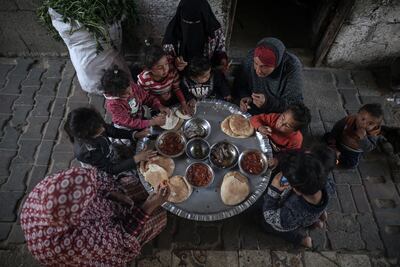About 400,000 Palestinians in the West Bank and Gaza could be cut off from the World Food Programme's humanitarian assistance by May 1, unless additional funding arrives before then.
Families that require assistance are given e-vouchers linked to an account in their name. These e-vouchers can be used to make purchases of specific food items from about 300 stores.
"We make sure that the card is only used to make healthy food purchases," a WFP representative in Jerusalem told The National. The voucher cannot be used to buy cigarettes or junk food.
"Printing the names of the mother as well as the father on the card has also fostered better family dynamics because there's no longer a doubt or concern that the cash assistance went towards anything other than providing food for the family."
Beneficiaries feel that using the card is also more dignified than having to wait in queues for handouts, the WFP previously said.
But with Ramadan currently under way and food prices on a continuous rise, those monthly e-vouchers are not sufficient to provide needy families with the same amount of food they used to get a year ago.
"We began reducing the consumption of basic commodities due to price increases. This means instead of eating four packs of bread a day, we now eat three. The price of flour has also gone up from 42 to 88 shekels. How's that even possible," said the father of five, Yassir Khalil, 56.
"The voucher's value is 245 shekels ($60). This used to last us three weeks. Now it barely lasts us one week."
His wife said that she only cooks one meal a day and sometimes not at all.
In Gaza, where the situation is even dire, Um Emad lives with her six children with most responsibilities resting on her shoulders.

"Electricity, gas, water and food. Everything is asked of me. If it wasn't for God and the e-voucher, which gets us chicken, milk and rice, we wouldn't have been able to eat," Ms Emad said.
Unemployment in Gaza remains very high despite a strong economic rebound post Covid in 2021, growing to 26.4 per cent by the end of the year, International Monetary Fund figures have shown.
"The unemployment rate in Gaza remains stubbornly high, reflecting restrictions on movement of people and goods, and is closely associated with a high prevalence of poverty," the IMF report in August last year said.


